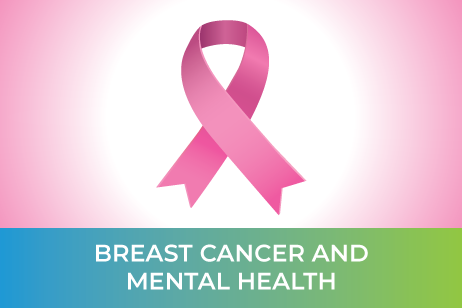
While breast cancer is a physical illness, it is one with significant mental health impact too.
People learning of their breast cancer diagnosis – or discovering their elevated risk for this disease – can experience a wide range of challenging feelings, such as anxiety, sadness, anger, and frustration. These difficult emotions may also arise during and after breast cancer treatment. It is important to consider that these feelings may be normal reactions to distressing life events, and there are effective ways to address them so they do not impact day-to-day life.
If these negative feelings become overwhelming or chronic, it is vital to seek help so they can be treated before they worsen and impair daily function, compromise quality of life, and/or interfere with breast cancer treatment.
In addition to severe or persistent negative emotions, additional signs of distress include:
- Lack of restful sleep
- Constant fatigue or pain
- Withdrawal from social interactions or enjoyable activities
- Not eating well or exercising
- Increased use of alcohol, tobacco, or other drugs to manage negative emotions
If you or someone you know is living with or impacted by breast cancer and are experiencing these or other mental health symptoms, do not hesitate to seek well-being support. This can include practicing self-care, talking to loved ones, engaging community resources, and bringing up these concerns with the care team (primary doctor, oncologist, nurse and/or mental health professional).
There are a variety of well-being resources and supports available for those living with and impacted by breast cancer, including:
- American Cancer Society’s Reach to Recovery program, which connects participants with breast cancer survivors for one-on-one support
- The Cancer Support Community’s Support Line at (888) 793-9355
- The Susan G. Komen Breast Care Helpline at (877) 465-6636 or emailing helpline@komen.org
- Calling 211 or visiting https://211la.org for linkage to breast cancer support groups, supportive services, and other resources
Additional mental health resources are also available through:
- LACDMH’s 24/7 Help Line at (800) 854-7771
- The iPrevail online well-being platform
- Calling/texting 988 Suicide & Crisis Lifeline
We also encourage the following practices to improve well-being:
- Keeping a journal to increase awareness of symptoms, feelings, and experiences
- Practicing mindfulness to improve the mind-body connection
- Developing and maintaining healthy habits
- Building and continuing social connections to family, friends, and communities
- Talking to your healthcare team regularly about well-being issues and concerns
Identifying and addressing well-being challenges in a timely manner can not only improve quality of life but may also lead to better overall health outcomes. We encourage you to use the above strategies and resources to promote your mental and physical health.
For more breast cancer-related information and resources, visit the American Cancer Society’s breast cancer site.
Additional Articles About Breast Cancer and Mental Health:
- How Breast Cancer Can Affect Mental Health (BreastCancer.org)
- Breast Cancer and Mental Health (Psychology Today)
- Breast Cancer: How Your Mind Can Help Your Body (American Psychological Association)
- The Emotional Impact of Breast Cancer (WebMD)
- 4 Ways to Improve Emotional Health for Breast Cancer Patients and Survivors (Susan G. Komen)
- Breast Cancer and Emotional Health (Living Beyond Breast Cancer)

